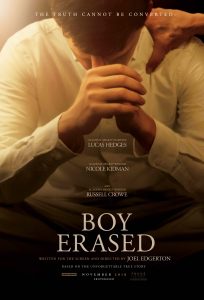“A Private War” (2018). Cast: Rosamind Pike, Jamie Dornan, Stanley Tucci, Tom Hollander, Faye Marsay, Greg Wise, Corey Johnson, Nikki Amuka-Bird, Alexandra Moen, Fady Elsayed, Raad Rawi, Amanda Drew, Jérémie Lahuerte. Director: Matthew Heineman, Screenplay: Arash Amel. Story Source: Marie Brenner, “Marie Colvin’s Private War,” Vanity Fair magazine. Web site. Trailer.
Getting at the truth under trying circumstances can be challenging to say the least. But imagine what that undertaking might be like with the added dangers of bullets whizzing overhead and unseen land mines potentially lurking in the path of our every step. Such a pursuit takes someone genuinely committed and eminently earnest about arduous tasks like these, the kind of individual profiled in the gripping new biopic, “A Private War.”
London Times war correspondent Marie Colvin (Rosamund Pike) was never one to back off from a challenge. In years of covering conflicts in the world’s hotspots, she frequently took risks to get the story, even if it meant placing her own personal safety in jeopardy. Through her forays into Sri Lanka, Iraq, Afghanistan, Libya and Syria, she often followed her own path to the truth, even when if it meant costing her most of the use of one eye. But her work was truly astounding, earning her major professional accolades for her reporting.
[caption id="attachment_10291" align="aligncenter" width="300"] London Times war correspondent Marie Colvin (Rosamund Pike) scans the map to learn about her next assignment in the gripping biopic, “A Private War.” Photo by Paul Conroy, courtesy of Aviron Pictures.[/caption]
London Times war correspondent Marie Colvin (Rosamund Pike) scans the map to learn about her next assignment in the gripping biopic, “A Private War.” Photo by Paul Conroy, courtesy of Aviron Pictures.[/caption]
With the aid of photographer Paul Conroy (Jamie Dornan), Colvin made a particular effort to address the “human” side of inflamed conflicts. Headlines were one thing, but letting the world know about the high personal cost of war thrust upon those unwittingly caught in the crossfire was equally, if not more, important. She endeavored to reveal the suffering inflicted upon the innocents – the wives, mothers and children – who just happened to be in the wrong place at the wrong time. This was particularly true during her reporting from Syria, where she made front page news and informed the world of the horrific carnage occurring around her.
Such devotion, however, took its toll on Marie herself. Her personal life was virtually nonexistent – no family and only scant romantic involvements with men who were unfaithful (Greg Wise) or for whom she never seemed to find enough time (Stanley Tucci). Her few friends (Nikki Amuka-Bird, Amanda Drew) worried dearly about her. And even her editor, Sean Ryan (Tom Hollander), who stalwartly supported her efforts, had doubts at times about her judgment when it came to the approaches she took to her assignments. These concerns became particularly troubling through Marie’s steadily increasing drinking, placing her on the precipice of becoming an alcoholic, and a bout of PTSD that she suffered after her stint in Iraq and that landed her in a special treatment facility.
Still, despite these pitfalls, Colvin would not back off. Over time she came to recognize that she was personally torn about her calling. She abhorred the misery and strife of war zones, yet she also couldn’t keep herself away from them. As long as there were those who were suffering, she felt compelled to bring their stories to light for the world to see. This became, as the film’s title suggests, her own “private war,” one that was chronicled in a Vanity Fair magazine article that inspired this picture.
[caption id="attachment_10292" align="aligncenter" width="300"] London Times war correspondent Marie Colvin (Rosamund Pike, left), accompanied by photographer Paul Conroy (Jamie Dornan, right), endeavors to get stories from the frontlines in such hotspots as Iraq, Afghanistan, Libya and Syria, as seen in the intense new film biography, “A Private War.” Photo courtesy of Aviron Pictures.[/caption]
London Times war correspondent Marie Colvin (Rosamund Pike, left), accompanied by photographer Paul Conroy (Jamie Dornan, right), endeavors to get stories from the frontlines in such hotspots as Iraq, Afghanistan, Libya and Syria, as seen in the intense new film biography, “A Private War.” Photo courtesy of Aviron Pictures.[/caption]
Colvin’s experience exposes the turmoil that can occur when we maintain beliefs that are in conflict with one another, one of the pitfalls that can arise with the conscious creation process, the philosophy that maintains we employ our thoughts, beliefs and intents to manifest our existence. Try as we might to identify, clarify and implement these metaphysical building blocks as effectively and efficiently as possible, even those of us who are practiced in this process may suffer the ill effects of giving rein to contradictory notions.
In some cases, this may result from a lack of awareness of a belief conflict. In others, we may recognize the quandary but are unable to resolve it, either because we can’t envision workable solutions or can’t see past seemingly insurmountable limitations. And, in still others, strange as it might sound, such belief opposition may actually satisfy some kind of need, goal or desire, one whose underlying nature may take some digging to identify, understand and reconcile.
Given Colvin’s drive to tell the stories of those unable to speak for themselves, it’s understandable how she would feel compelled to keep at her work, regardless of the inherent dangers and drawbacks associated with it. As repulsed as she was by the wartime atrocities going on around her, and as readily as she came to recognize this fact, she still couldn’t drag herself away from these difficult circumstances, continually forging ahead to fulfill her mission.
[caption id="attachment_10293" align="aligncenter" width="300"] With occasional companion Tony Shaw (Stanley Tucci, left), London Times war correspondent Marie Colvin (Rosamund Pike, right) accepts one of many honors she received during her prestigious career as seen in “A Private War.” Photo by Paul Conroy, courtesy of Aviron Pictures.[/caption]
With occasional companion Tony Shaw (Stanley Tucci, left), London Times war correspondent Marie Colvin (Rosamund Pike, right) accepts one of many honors she received during her prestigious career as seen in “A Private War.” Photo by Paul Conroy, courtesy of Aviron Pictures.[/caption]
That kind of dedication doesn’t happen without focused, determined beliefs underlying it. That, consequently, also illustrates the intrinsic power of our beliefs. If they can keep us plugging away at undertakings that we find questionable or rash, there’s something to be said for what they can impel into being. That can be tremendously moving, informative and persuasive, even under trying conditions. It also reveals the tremendous compassion underpinning such efforts, something we could use more of, especially in an age of an increasingly cynical and self-serving media establishment.
But the power of our beliefs need not be limited to situations where we feel obligated, if not burdened, to expose a nasty truth or to shake a sleeping public out of its complacency. Imagine what the power of our intentions might help us accomplish if it were to be employed for beneficial and beautiful endeavors, especially those we truly enjoy. This is where the magnificence of our beliefs, and the conscious creation process through which they’re employed, can really shine.
No matter how those beliefs are used, though, when they’re employed in ways where they help to bring about the betterment of ourselves and of our fellow man, they activate the conscious creation concept of value fulfillment. This could include anything from creating great works of art to providing care to the needy to writing about the truth of the horrors of war. In her own way, Marie Colvin understood this and made it her value fulfillment mission, despite the tremendously high personal cost that came with it.
[caption id="attachment_10294" align="aligncenter" width="300"] Ever challenged for her credentials when present in war zones, London Times correspondent Marie Colvin (Rosamund Pike) faces incessant uncertainty when seeking to get the story in “A Private War.” Photo by Keith Bernstein, courtesy of Aviron Pictures.[/caption]
Ever challenged for her credentials when present in war zones, London Times correspondent Marie Colvin (Rosamund Pike) faces incessant uncertainty when seeking to get the story in “A Private War.” Photo by Keith Bernstein, courtesy of Aviron Pictures.[/caption]
Those who have never worked as journalists may find such compulsive attitudes difficult to fathom. However, having once worked in the field myself (though admittedly not on a scale anywhere near that of the protagonist), I understand what it means to feel drawn to uncovering the truth of a story and to make it known to an awaiting audience. When the stakes are especially high, as they were in the conflicts Colvin covered, the need to fulfill that mission becomes particularly strong, no matter what it takes to get it done. Were it not for intrepid reporters like her, stories like this might not otherwise see the light of day.
Although at times a little weak on back story, this otherwise-gripping biopic about the protagonist’s dogged determination to get the story sizzles with bold intensity, especially in its uncompromising depictions of the horrors she witnessed firsthand and in the personal toll such events took on her physically and emotionally. Pike’s stellar performance is certainly award-worthy, showing the many sides of a complex character who frequently straddled the line between bravery and recklessness. Be forewarned, however, that the graphic nature of this offering makes it a questionable choice for sensitive and squeamish viewers. But, for those who like their heroic tales larger than life and rooted in truth, this one is definitely for you.
Like another recent release about the lives of war correspondents, “Viper Club”, this film poignantly reveals the sacrifices these individuals are willing to endure and the risks they’re willing to take in making sure the truth is known. Some might see them as brave, gallant souls, while others may view them as foolhardy and careless. The belief conflicts that they wrestle with alone are a substantial burden to take on. Nevertheless, no matter how these individuals are viewed, what they accomplish in the end is what’s most important, efforts for which they deserve every recognition possible. Were it not for this kind of determination, as well as the compassion that goes along with it, we might all be kept in a darkness that would ultimately be even more frightening than any war we might live through.
Copyright © 2018, by Brent Marchant. All rights reserved.
Wednesday, November 28, 2018
‘A Private War’ wrestles with belief conflicts
Back on the Air!







Monday, November 26, 2018
This Week in Movies with Meaning



Saturday, November 24, 2018
‘Boy Erased’ inspires awakening to the truth
“Boy Erased” (2018). Cast: Lucas Hedges, Nicole Kidman, Russell Crowe, Joel Edgerton, Madelyn Cline, Victor McCay, David Joseph Craig, Troye Sivan, Jesse LaTourette, Théodore Pellerin, Flea, Joe Alwyn, Britton Sear, Cherry Jones, Xavier Dolan, Drew Scheid. Director: Joel Edgerton. Screenplay: Joel Edgerton. Book: Garrard Conley, Boy Erased. Web site. Trailer.
What are we to do when the reality of our self doesn’t match the image we hold – or that we believe we’re supposed to hold – of it? The frustration such circumstances engender can be maddening, perhaps threatening our prevailing worldview and causing us considerable anguish. That’s especially true when we’re pressured by others to conform to certain standards of behavior and outlooks on life that we know don’t suit who we truly are. So how do we reconcile such a conundrum? That’s what a troubled teen is forced to deal with in the new, fact-based drama, “Boy Erased.”
By all accounts, Jared Eamons (Lucas Hedges) is a fine, upstanding young man. As a star basketball player and an accomplished student getting ready to head off to college, Jared is the pride of his loving parents, Nancy (Nicole Kidman), a traditional homemaker, and Marshall (Russell Crowe), the owner of a car dealership and preacher at the local Baptist church. Outwardly, Jared lives up to all of the expectations placed upon him, embodying a model Christian youth who’s supposed to set a shining example for his peers. He loves his parents and his faith, and he seems ready to follow a traditional courtship path with his high school sweetheart, Chloe (Madelyn Cline). There’s just one problem – Jared suspects he’s gay, and it troubles him deeply, afraid that such “unnatural” feelings will disappoint his parents, his God and himself.
[caption id="attachment_10277" align="aligncenter" width="300"] Troubled teen Jared Eamons (Lucas Hedges, left) confesses his concern that he might be gay to his Baptist fundamentalist parents, Marshall (Russell Crowe, center) and Nancy (Nicole Kidman, right), in director Joel Edgerton’s “Boy Erased.” Photo courtesy of Focus Features.[/caption]
Troubled teen Jared Eamons (Lucas Hedges, left) confesses his concern that he might be gay to his Baptist fundamentalist parents, Marshall (Russell Crowe, center) and Nancy (Nicole Kidman, right), in director Joel Edgerton’s “Boy Erased.” Photo courtesy of Focus Features.[/caption]
Jared tries desperately to squelch his thoughts for a long time, but, no matter how earnestly he does so, there’s no denying the persistence of such notions. Finally, while on a break home from college, he decides to confess his feelings to his parents, despite having never overtly acted on them. Needless to say, Nancy and Marshall are both quietly distressed, but, rather than fly into a tirade, mom and dad calmly and “rationally” seek to come up with a solution. And, after consultation with a pair of “learned” peers from the congregation, Marshall and Nancy offer a proposal to their son – enrollment in a church-sponsored “conversion therapy program” to help set him straight, literally (or so they believe).
Jared’s parents tell him that they still love him, despite his wayward “flaw.” However, they also make it plain that, if he hopes to remain under their roof and in their lives, he must comply with their wishes. They insist that he must rid himself of the “sin” that so blatantly and offensively goes against the tenets of their faith and that would almost assuredly cast aspersions on them by members of the congregation of their Arkansas parish. Should he refuse this, he would need to find new accommodations for himself and risk not seeing either of them again. So, to avoid such an unthinkable outcome, Jared agrees to their terms, expressing what appears to be a sincere desire to change and to return to the path that he has long known and from which he has strayed. He freely embarks on this journey, but it’s a sojourn that turns out to be nothing like what he expected.
Before long, Jared begins attendance at his “therapy” sessions, a program led by a “counselor,” Pastor Victor Sykes (Joel Edgerton). Jared’s regimen consists of a hodgepodge of Christian fundamentalism and psychological mumbo jumbo, mixed with coercive reinforcement of archaic gender-based stereotypes, and, when deemed necessary, corporal and emotional punishment. And those in the program who don’t comply with the counselor’s dictates are subject to guilt-driven ostracism and/or strong-arm tactics implemented by his creepy, bleary-eyed goon squad (Victor McCay, David Joseph Craig, Flea).
[caption id="attachment_10278" align="aligncenter" width="300"] Conversion therapy counselor Pastor Victor Sykes (Joel Edgerton) attempts to use a mixture of Christian fundamentalism and other tactics to set his gay program participants straight – literally – in the new fact-based drama, “Boy Erased.” Photo courtesy of Focus Features.[/caption]
Conversion therapy counselor Pastor Victor Sykes (Joel Edgerton) attempts to use a mixture of Christian fundamentalism and other tactics to set his gay program participants straight – literally – in the new fact-based drama, “Boy Erased.” Photo courtesy of Focus Features.[/caption]
As sincere as Jared is when he first enters the program, he’s not sure what to make of it the longer he’s in it. He’s conflicted by the various reactions he encounters from other participants, unsure of how to respond to the dogmatic teachings and questionable homework assignments he’s given. He’s troubled by the quiescent reactions of Sarah (Jesse LaTourette) and Cameron (Britton Sear), both of whom capitulate seemingly against their wishes, to avoid punishment and persecution, the kind routinely inflicted upon those who are prime targets for the psychological and physical bullying doled out by Sykes and his staff. By contrast, there’s Jon (Xavier Dolan), a long-term program participant who lives in special on-site housing and willingly (though unconvincingly) professes to buy into everything that he’s been taught. And then there’s Gary (Troye Sivan), a participant who outwardly appears to go along with the program’s attempted brainwashing but who secretly has no intention of doing so; he fakes everything to get by, advice he readily shares with Jared, whom, because of his intensely honest nature, Gary suspects is genuinely incapable of drinking the counselor’s Kool Aid.
Jared’s doubts about his prospects of success get further put to the test when he’s assigned to take inventory of his feelings toward men. Through a series of flashbacks, Jared considers his memories of and emotions about the “involvements” (comparatively innocent though they were) that he’d had with other members of his gender. There’s his college friend Henry (Joe Allwyn), a closeted young man who tries to deny his impulses (and his feelings toward Jared) but who ultimately can’t stifle the intensity of his smoldering passion. Then, by contrast, there’s Xavier (Théodore Pellerin), an artist with an honest and open attitude toward his feelings for Jared but who also takes a decidedly unpressured approach in making them known. As Jared muses about these encounters, he takes stock of his feelings, an assessment that leads to more uncertainty about his leanings – and his future.
[caption id="attachment_10279" align="aligncenter" width="300"] Concerned mother Nancy Eamons (Nicole Kidman, back to camera and right) tries to console her troubled son, Jared (Lucas Hedges, center), after he makes a disturbing revelation in the new fact-based family drama, “Boy Erased.” Photo courtesy of Focus Features.[/caption]
Concerned mother Nancy Eamons (Nicole Kidman, back to camera and right) tries to console her troubled son, Jared (Lucas Hedges, center), after he makes a disturbing revelation in the new fact-based family drama, “Boy Erased.” Photo courtesy of Focus Features.[/caption]
How will all of this play out for Jared? What impact will it have on his relationship with his family? And what path will he follow going forward? That’s what he must address – and reconcile – for himself as he decides what best suits him for his future.
Jared’s experience is a prime example of the power and persistence of beliefs, the building blocks of the conscious creation process, the philosophy that maintains we use them in manifesting the reality we experience. However, his odyssey also poignantly reveals to us that we harbor beliefs that are both known and unknown and that those we’re unaware of can have just as much influence in shaping our existence as those of which we’re fully cognizant.
For instance, he’s clear about the beliefs he holds regarding the love he holds for his faith and family, but he’s uncertain about his feelings toward men and where such beliefs might be coming from. Consequently, he attempts to deny those that don’t fit with the beliefs he recognizes. However, this proves to be a futile effort, since those beliefs are just as present – and just as powerful – as those of which he’s aware. To disavow such thoughts is to disavow a part of himself, one that ultimately won’t be denied.
[caption id="attachment_10280" align="aligncenter" width="300"] Concerned parents Nancy (Nicole Kidman, left) and Marshall Eamons (Russell Crowe, right) discuss how to help their troubled son resolve a personal crisis in director Joel Edgerton’s latest offering, “Boy Erased.” Photo courtesy of Focus Features.[/caption]
Concerned parents Nancy (Nicole Kidman, left) and Marshall Eamons (Russell Crowe, right) discuss how to help their troubled son resolve a personal crisis in director Joel Edgerton’s latest offering, “Boy Erased.” Photo courtesy of Focus Features.[/caption]
As anyone who has ever gone through psychological counseling knows, becoming aware of such previously obscured beliefs and motivations is part of the treatment process. It’s the same in becoming a practiced conscious creator, too, an aspect of the process where we learn how to become more “conscious” in the creations we materialize. To be able to do so, and to be able to successfully manifest what we know is genuinely coming from our true selves, often is a source of great joy, satisfaction and fulfillment. It’s a case of living up to who we really are as authentic beings. And, in a world often rife with denial, hypocrisy and artifice, this is generally a refreshing change for how we live our lives, no matter what they might entail.
This is the process that Jared is just beginning to go through, his sexuality being the prime area of initial exploration. However, once he has an awakening experience such as this, it opens doors for him in a wide array of areas, all of which are aimed at helping him discover, acknowledge and validate the nature of his true self. It’s something that we’re all capable of experiencing as we embark on our journeys into the world of conscious creation, be it in our sexual orientation or any other field of endeavor. What matters most, though, is that we earnestly make the effort to engage in this process, no matter what area of exploration is opened up for inspection.
Of course, one of the keys is becoming aware of the existence of the conscious creation process in the first place, because that’s essential to begin our examination of the beliefs that drive it. This means letting go of the practice of un-conscious creation, one in which our beliefs manifest what we experience without our awareness of them or the larger context in which they’re couched. When we give this undisciplined practice free rein, there’s no telling what we might get. To a certain degree, this is even apparent in Jared’s experience, particularly when it comes to his interaction with Henry. It proves to be nothing that he wants, yet it’s driven in part by concealed beliefs that manifest the outcome he experiences. If he doesn’t want such results, then he’ll have to take a hard, honest look at the beliefs he’s genuinely holding and deliberately alter them accordingly so that they’re more in line with what he desires.
[caption id="attachment_10281" align="aligncenter" width="300"] Conversion therapy program participant Gary (Troye Sivan) has his own way of dealing with the dogmatic rhetoric being thrust upon him and his peers in “Boy Erased.” Photo by Kyle Kaplan, courtesy of Focus Features.[/caption]
Conversion therapy program participant Gary (Troye Sivan) has his own way of dealing with the dogmatic rhetoric being thrust upon him and his peers in “Boy Erased.” Photo by Kyle Kaplan, courtesy of Focus Features.[/caption]
In conducting such an assessment and becoming clearer about the true nature of our beliefs, we must also be prepared to face down the fears and limitations that are holding us back from achieving what we want. Admittedly, this can be difficult, since the realizations that come from such introspection usually require us to step out of our comfort zones, to move from what is familiar and known and into uncharted territory, a prospect many of us may find intimidating or downright scary. However, it’s precisely that unfamiliarity that holds us back, and, if we’re willing to let go of it, we often find that there’s a rich new world that awaits us when we traverse across such unknown thresholds.
This is the process that Jared is going through as his story plays out. He’s unsure about what awaits him by living a gay lifestyle, yet he’s also drawn to it because he knows that’s what will ultimately give him the satisfaction he seeks. To pursue such an undertaking, he must let go of the fear that’s holding him back, as well as the arbitrary limitations he’s allowed himself to buy into, such as the admonitions of his fundamentalist Christian upbringing, that are keeping him from moving forward and exploring what he needs to find fulfillment and peace of mind.
One might wonder why Jared has chosen such a difficult path in making his way toward his eventual happiness, and that question indeed has merit. But perhaps his path ultimately has to do with more than just his self-acceptance. Maybe it also involves a larger issue, such as going through the conversion therapy process to be able to later expose it for the sham that it is, to reveal the fallacies of its principles and the false hope it holds out to those who shell out vast sums of money for a misguided and cruel program that frequently does more harm than good.
[caption id="attachment_10282" align="aligncenter" width="300"] Teen Jared Eamons (Lucas Hedges, right) tentatively explores his emerging gay sensibility with a caring, sensitive artist, Xavier (Théodore Pellerin, left), in director Joel Edgerton’s “Boy Erased.” Photo courtesy of Focus Features.[/caption]
Teen Jared Eamons (Lucas Hedges, right) tentatively explores his emerging gay sensibility with a caring, sensitive artist, Xavier (Théodore Pellerin, left), in director Joel Edgerton’s “Boy Erased.” Photo courtesy of Focus Features.[/caption]
Making the public aware of scams like this truly a noble cause, one reflective of the conscious creation concept known as value fulfillment, the practice of being our best, truest selves for the betterment of ourselves and those around us. This practice is often associated with the destiny that we’re meant to live out in life, the quest with which we marshal our beliefs to bring about a particular, and frequently necessary, outcome that benefits many in society. By drawing attention to our experiences, as Jared does so effectively through his, we can alert others to the perils of shady undertakings like these. And that is quite a laudable creation, to be sure.
That, in many ways, is the very point of this picture as well. Filmmaker Joel Edgerton’s second time behind the director’s chair on a feature-length release makes the world abundantly aware of the pitfalls of conversion therapy, alerting viewers to such matters as the fact that there are currently 36 states that have no legal bans against these programs. In bringing this production to life, Edgerton and his crew are living out their own form of value fulfillment, one that would assuredly make the film’s protagonist proud.
Thankfully, “Boy Erased” effectively skewers the sham of conversion therapy without becoming shrill, resorting to clichés or getting tied up in over-the-top rhetoric. With fine performances by Hedges, Crowe, Kidman and Edgerton, as well as a superbly written script, the film delivers a solid, well-told story, full of empathy, sincerity and heart. The pacing in the first 30 minutes could be a little swifter, but that minor shortcoming detracts little from this finely made offering. This strong awards season contender is sure to give many other laudable releases a run for their money.
The journey to find our true selves may not be an easy one. There could be plenty of challenges, difficulties and disappointments along the way. But, if we earnestly seek to discover the nature of the beliefs that really make us who we are, we can create an existence in line with such notions, one fully fleshed out in all the ways that we find enjoyable and fulfilling. And, should we succeed at that, we need never worry about our lives or our very being ever being erased.
Copyright © 2018, by Brent Marchant. All rights reserved.
Tuesday, November 20, 2018
‘Bohemian Rhapsody’ celebrates living life on one’s own terms
“Bohemian Rhapsody” (2018). Cast: Rami Malek, Lucy Boynton, Gwilym Lee, Ben Hardy, Joe Mazzello, Aidan Gillen, Allen Leech, Tom Hollander, Mike Myers, Aaron McCusker, Ace Bhatti. Maneka Das, Priya Blackburn, Dermot Murphy, Neil Fox-Roberts. Director: Bryan Singer. Screenplay: Anthony McCarten. Story: Anthony McCarten and Peter Morgan. Web site. Trailer.
So often in life, we end up settling, taking jobs we merely tolerate, getting into relationships that are less than satisfying, and sacrificing our creative visions for purposes of practicality, convenience or commercialization. How unfulfilling those experiences generally prove to be. But need things be that way? Can we live our lives on our terms, attaining the gratification we crave? Maybe it just takes a little inspiration to put us on the path toward that kind of personal, professional and creative fulfillment, an example amply depicted in the provocative new biopic, “Bohemian Rhapsody.”
What does it mean to live a royal lifestyle without being a member of the monarchy? Just ask Freddie Mercury (Rami Malek), lead singer of the legendary rock band Queen, itself an iconic ensemble in the world of pop music. From 1970 to his death in 1991, the flamboyant front man with a four-octave vocal range left a mark on the music world as a singer, songwriter, instrumentalist and arranger, both as part of the band and as a solo artist, as well as a producer of other artists. His wide-ranging contributions to the field of rock music, with influences from a variety of other genres including everything from funk to opera, helped distinguish Mercury as a singular talent unlike virtually anyone else in the business.
[caption id="attachment_10269" align="aligncenter" width="300"] Freddie Mercury (Rami Malek), lead singer of the legendary rock band Queen, belts out one of the group’s classic numbers during a performance at 1985’s Live Aid benefit concert, as seen in the new biopic, “Bohemian Rhapsody.” Photo by Alex Bailey @ 2018 Twentieth Century Fox Film Corporation.[/caption]
Freddie Mercury (Rami Malek), lead singer of the legendary rock band Queen, belts out one of the group’s classic numbers during a performance at 1985’s Live Aid benefit concert, as seen in the new biopic, “Bohemian Rhapsody.” Photo by Alex Bailey @ 2018 Twentieth Century Fox Film Corporation.[/caption]
Born Farrokh Bulsara in Tanzania in 1946, the enigmatic musician and artist of Parsi descent spent much of his childhood in Mumbai and Africa before he and his family (Ace Bhatti. Maneka Das, Priya Blackburn) emigrated to England to escape the persecution of Indians during the Zanzibar Revolution. Once in London, he took an active interest in the local music scene while working as a baggage handler at Heathrow Airport and as a secondhand clothing purveyor in a resale shop with his eventual girlfriend Mary Austin (Lucy Boynton). His big break came in 1970, when Farrokh, now known by the stage name Freddie Mercury, teamed up with guitarist Brian May (Gwilym Lee) and drummer Roger Taylor (Ben Hardy) in a band called Smile after that group’s lead singer quit. A year later the trio was joined by bassist John Deacon (Joe Mazzello), and the group’s name was changed to Queen, a designation Mercury considered more regally befitting of the ensemble’s self-assured attitude and diverse, profound talent.
With Mercury’s flamboyant stage presence and his emergence as a solid songwriter, along with the strong supportive backing of manager John Reid (Aidan Gillen), best known for skyrocketing the career of Elton John, the band took off with hits like the campy pop number “Killer Queen”, the enigmatic operatic-inspired “Bohemian Rhapsody” and the heartfelt ballad “Love of My Life”, a song Mercury penned for Mary. These diverse compositions revealed a tremendous range, one that helped set Queen apart from other acts.
Fans ate up the band’s varied musical styles, which was good for building a loyal following but which also made the group difficult to classify, a quandary for Ray Foster (Mike Myers), the head of Queen’s record label, EMI Records. To counter that argument, Mercury and his band mates insisted that such musical diversity is what made Queen the phenomenon that it was becoming, but Foster would have none of that, especially when the group pressed for having the six-minute-long “Bohemian Rhapsody” released as a single off their album A Night at the Opera in 1975. Foster refused their request, and the band walked out, the quartet proclaiming on their departure that Foster would become known as the man who lost Queen, a fateful prediction that would eventually become notorious in the music business.
[caption id="attachment_10270" align="aligncenter" width="300"] Members of the legendary rock band Queen (from left, drummer Roger Taylor (Ben Hardy), guitarist Brian May (Gwilym Lee), bassist John Deacon (Joe Mazzello) and lead singer Freddie Mercury (Rami Malek)) record one of their classic hits, as seen in the engaging new biopic, “Bohemian Rhapsody.” Photo by Alex Bailey @ 2018 Twentieth Century Fox Film Corporation.[/caption]
Members of the legendary rock band Queen (from left, drummer Roger Taylor (Ben Hardy), guitarist Brian May (Gwilym Lee), bassist John Deacon (Joe Mazzello) and lead singer Freddie Mercury (Rami Malek)) record one of their classic hits, as seen in the engaging new biopic, “Bohemian Rhapsody.” Photo by Alex Bailey @ 2018 Twentieth Century Fox Film Corporation.[/caption]
As Queen’s star power soared, Mercury and his cohorts began living the lifestyle of true rock gods. For Freddie, this enabled him to lead the extravagant, outrageous life he always aspired to. In pursuing such a lavish way of life, he began leaving his old existence behind, and one of the casualties of this was Mary. While he freely acknowledged that she was indeed his soul mate, her grounding influence wasn’t enough to rein in someone who was increasingly interested in indulging his whims and experimenting with what life had to offer, particularly in the sexual arena.
Freddie began exploring his gay side, eventually becoming lovers with Paul Prenter (Allen Leech), John Reid’s assistant. The relationship ultimately proved to be a disaster, though, as Paul’s opportunistic nature surfaced. Over time, Paul manipulated Freddie into unilaterally firing Reid, a move that spawned discord in the band. He also surrounded Freddie with an array of bad influences who enabled him to live out his fantasies but who also contributed to undermining his health and well-being. As rapidly as his star rose, Freddie was on a decline personally and professionally, a cycle that only ended when he broke off this toxic relationship.
[caption id="attachment_10271" align="aligncenter" width="300"] Freddie Mercury (Rami Malek, right), lead singer for the legendary rock band Queen, struggles to define his relationship with his soul mate, Mary Austin (Lucy Boynton, left), in “Bohemian Rhapsody.” Photo by Alex Bailey @ 2018 Twentieth Century Fox Film Corporation.[/caption]
Freddie Mercury (Rami Malek, right), lead singer for the legendary rock band Queen, struggles to define his relationship with his soul mate, Mary Austin (Lucy Boynton, left), in “Bohemian Rhapsody.” Photo by Alex Bailey @ 2018 Twentieth Century Fox Film Corporation.[/caption]
Meanwhile, Freddie began growing concerned that he may have contracted AIDS, the devastating illness that was ravaging the gay community at the time. He wondered how much time he had left and wanted to make the most of it, first by patching up his relationship with his musical colleagues and then by smoothing over his fragile friendship with Mary. He also wanted to explore relationship possibilities with Jim Hutton (Aaron McCusker), a kindly but no-nonsense server who worked at one of Freddie’s outlandish soirees. Making peace with himself and his life became crucial with the prospect of a death sentence hanging over him.
In addition to these personal reconciliations, Freddie felt compelled to leave some kind of lasting professional legacy as well. That opportunity arose when Queen was offered the chance to perform at Live Aid in 1985, the legendary benefit concert organized by activist and musician Bob Geldof (Dermot Murphy) designed to help raise funds for the starving in Ethiopia. With an extensive broadcast satellite network linking the globe to live performances in London and Philadelphia, the concert was slated to feature appearances by such luminaries as Paul McCartney, Elvis Costello, David Bowie, U2, The Who, Madonna, Duran Duran, Mick Jagger, Tina Turner, Bob Dylan and Tom Petty, among others. Joining such a line-up gave Queen a chance to join elite company and to perform on a worldwide stage, and Freddie and the band took full advantage of the opportunity. The group’s 21-minute Live Aid segment would later go on to be voted the best live rock performance in music history. In that brief span, Mercury cemented his place as one of the most iconic figures in rock of all time.
Despite some of his excesses and exercises in questionable judgment, Freddie’s story brilliantly shows us what it means to live life on our own terms. He may have drawn criticism for some of his choices and behavior, but he refused to compromise himself artistically or to shy away from pursuing life’s pleasures to their fullest. He packed a lot of experiences into his 45 years, and, even though his time may have been shorter than he probably hoped for, he certainly had a great ride, one that many of us would likely envy, especially those among us who refuse to get off the sidelines and enjoy what our existence has to offer.
[caption id="attachment_10272" align="aligncenter" width="300"] At the conclusion of their 1985 Live Aid performance, members of the legendary rock band Queen (from left, guitarist Brian May (Gwilym Lee), drummer Roger Taylor (Ben Hardy), lead singer Freddie Mercury (Rami Malek) and bassist John Deacon (Joe Mazzello)) salute the crowd in London’s Wembley Stadium as seen in “Bohemian Rhapsody.” Photo by Alex Bailey @ 2018 Twentieth Century Fox Film Corporation.[/caption]
At the conclusion of their 1985 Live Aid performance, members of the legendary rock band Queen (from left, guitarist Brian May (Gwilym Lee), drummer Roger Taylor (Ben Hardy), lead singer Freddie Mercury (Rami Malek) and bassist John Deacon (Joe Mazzello)) salute the crowd in London’s Wembley Stadium as seen in “Bohemian Rhapsody.” Photo by Alex Bailey @ 2018 Twentieth Century Fox Film Corporation.[/caption]
So how is it that people like Freddie are able to live their lives on their own terms (and make it look comparatively easy)? It’s because they believe they can do, convinced that they’re able to transform their intangible intents into materialized tangible outcomes, the driving principle of the philosophy of conscious creation. It’s unclear whether or not Freddie ever heard of this doctrine, but, based on what he accomplished and how he led his life, it’s obvious that he had mastered its core concepts.
Freddie’s unshakable faith in his personal confidence was perhaps the greatest driving force in his belief toolbox. This enabled him to conduct his life without reservation, proceeding with his ambitions regardless of whatever criticisms or chiding might come his way, be it from his often-disapproving father, EMI’s Ray Foster or those critical of the band’s music. He simply followed his own dictates and didn’t let such hindrances get in the way, a quality that helped inspire the entire band, pushing the group’s level of greatness beyond what may have been attainable without his inventive influence.
The foregoing is also indicative of Freddie’s courageousness, his willingness to forge ahead without the encumbrance of fear, an influence that often inhibits or derails the flow of the conscious creation process. Getting past such limitations is a chief aim of the philosophy, and Mercury never hesitated to tackle obstacles that might hold him back. In fact, he even learned how to use potential drawbacks to his advantage. This is perhaps best seen in Freddie’s dental profile. Having been born with four extra incisors, he developed a somewhat pronounced overbite, a condition about which he was said to have been self-conscious. However, the extra teeth also made his extended vocal range possible, allowing him to reach those extra octaves and give his singing voice an added level of distinction. (Lemonade, anyone?)
By following his own path, Freddie clearly lived out his value fulfillment, the conscious creation concept associated with being our best, truest selves for the benefit of ourselves and those around us. Freddie Mercury and Queen gave us countless memorable musical numbers, most of them distinct in their own right and clearly differentiated from one another, a quality to which few bands can genuinely lay claim. That in itself is an accomplishment truly worth taking a bow.
As well made as this biopic is, “Bohemian Rhapsody” has nevertheless polarized viewers. In my view, though, many of the criticisms have struck me as cynical, superficial or, most importantly, insufficiently explained. Many reviews have contended things like “Freddie Mercury deserved a better movie” without offering further elaboration. Granted, the film has come under the microscope for some factual discrepancies and revisionist interpretations of certain historical events, criticisms that are not without merit. However, given that former band members Brian May and Roger Taylor were actively involved in the making of this production, one can’t help but wonder how much credence should be given to these disparagements.
Overall, this offering hits mostly right notes in telling its story and enlightening viewers about its central character. Malek is outstanding in the lead role, one that could have easily turned cartoonish if not properly handled. The re-creation of the band’s Live Aid performance is stunning, moving and uplifting. What a true joy it is to see someone fully living up to his potential in the moment, qualities that both made Mercury’s performance as well as Malek’s portrayal of it. If nothing else, see this one for this and the other excellent performance sequences, but don’t be surprised if you come away loving it for the rest of its qualities as well.
For his part, Freddie Mercury refused to settle, no matter what area of his life was involved. Had he done otherwise, he likely would have faded into obscurity (or worse). He realized, just as the title of one of Queen’s early hits suggests, that’s what it takes to “Keep Yourself Alive”. And, if we truly want the same for ourselves, we had all be prepared to follow suit. Only by doing that can we claim that we are the champions.
Copyright © 2018, by Brent Marchant. All rights reserved.
Monday, November 19, 2018
This Week in Movies with Meaning




Tuesday, November 13, 2018
‘Viper Club’ probes the depths of truth, compassion
“Viper Club” (2018). Cast: Susan Sarandon, Matt Bomer, Edie Falco, Lola Kirke, Julian Morris, Sheila Vand, Adepero Oduye, Amir Malaklou, Damian Young, Patrick Breen, Jerome Charvet, Mattea Conforti, Kristin Villanueva, Jack McCarthy. Director: Maryam Keshavarz. Screenplay: Maryam Keshavarz and Jonathan Mastro. Web site. Trailer.
Getting at the truth isn’t always easy. It may be obscured by camouflage, and accessing it may be difficult because of roadblocks or obstacles. And yet, once that elusive truth is found, it could potentially be so painful that one might wish it had stayed concealed. However, for those who are committed to seeing it being told, it takes certain skills, most notably in the areas of tact, compassion and forthrightness, to convey the information, especially to those most in need of hearing it. These are qualities essential to the missions of a courageous mother and son as seen in the gripping new drama, “Viper Club.”
Helen Sterling (Susan Sarandon) leads a hectic enough life as an emergency room nurse that she certainly doesn’t need any more drama than is already in it. But that wish, unfortunately, goes ignored when she learns that her son, Andrew (Julian Morris), a free-lance journalist covering the crisis in Syria, goes missing and is presumed kidnapped by terrorists, a reality confirmed when she receives a ransom demand for $20 million. A parent’s worst nightmare comes true, and she feels utterly helpless to do anything.
[caption id="attachment_10257" align="aligncenter" width="300"] Emergency room nurse Helen Sterling (Susan Sarandon) faces a crisis even greater than what she encounters at work when she learns that her son, a Syrian war correspondent, has been kidnapped and held for ransom in the gripping new drama, “Viper Club.” Photo by Walter Thomsen, courtesy of YouTube Premium and Roadside Attractions.[/caption]
Emergency room nurse Helen Sterling (Susan Sarandon) faces a crisis even greater than what she encounters at work when she learns that her son, a Syrian war correspondent, has been kidnapped and held for ransom in the gripping new drama, “Viper Club.” Photo by Walter Thomsen, courtesy of YouTube Premium and Roadside Attractions.[/caption]
Helen initially contacts government authorities, first through an FBI agent (Patrick Breen) and then a State Department official (Damian Young), for help. In true bureaucratic form, however, progress in securing Andrew’s release is excruciatingly slow, with endless red tape and incessant protocols. What’s worse, though, is that Helen is kept in the dark about what’s transpiring behind the scenes. And, on top of that, officials insist that she tell no one about her circumstances, leaving her to suffer in silence and solitude. Her hands are tied at every turn.
As Helen’s frustration grows, so, too, does her desire to take matters into her own hands, despite warnings from officials that her actions could jeopardize Andrew’s life. They also caution her that any attempt on her part to pay the ransom could land her (and anyone who assists her) in jail, given that such actions violate federal law. But, considering the persistent, protracted run-around that she’s been getting, Helen’s patience is running out.
With the encouragement of Andrew’s former girlfriend, Sheila (Sheila Vand), Helen is urged to make contact with her son’s unofficial support network, the Viper Club. This loosely organized but tightly knit group of peers and their backers aids free-lance war correspondents having no media organization affiliations with all kinds of assistance, from finances to security to hostage extraction. The network keeps a low profile but frequently manages to attain success, despite the organization’s clandestine and legally questionable nature.
[caption id="attachment_10258" align="aligncenter" width="300"] As members of the Viper Club support network for free-lance war correspondents, fund-raiser Charlotte (Edie Falco, left) and negotiator/go-between Sam (Matt Bomer, right) aid their peers and their families when faced with crises in their work, as seen in the intense new drama, “Viper Club.” Photo by Walter Thomsen, courtesy of YouTube Premium and Roadside Attractions.[/caption]
As members of the Viper Club support network for free-lance war correspondents, fund-raiser Charlotte (Edie Falco, left) and negotiator/go-between Sam (Matt Bomer, right) aid their peers and their families when faced with crises in their work, as seen in the intense new drama, “Viper Club.” Photo by Walter Thomsen, courtesy of YouTube Premium and Roadside Attractions.[/caption]
Unsure where else to turn, Helen meets with one of the club’s principal state-side contacts, Charlotte (Edie Falco), a well-to-do, well-connected networker who knows what Helen is going through, her son having been a former but successfully released hostage. In their initial meeting, Helen expresses concern about the ransom amount. She’s willing to hand over everything she has, but her resources come nowhere close to what’s being demanded. Charlotte reassures her, however, that, as one of the network’s chief fund-raisers, she’ll be able to quietly find the money. Thus, with the aid of other network members, such as Sam (Matt Bomer), a former journalist-turned-negotiator and go-between, the covert quest to secure Andrew’s release begins.
However, despite the encouraging progress made by the network, Helen is still left to wait for news largely on her own, reluctantly agreeing to adhere to the government’s admonition not to reveal her situation to anyone (or, at least, anyone else, that is). This leaves her with much time to think about her circumstances, particularly her relationship with Andrew. Through a series of flashbacks to when he was a child (Jack McCarthy), she reflects on the maturation of a boy who seemed the least likely candidate to grow up and become a war correspondent. She wonders what possessed him to pursue such a course, given that it seemed so completely out of character. Such pondering gives her great pause, especially in light of the conditions under which she now finds herself.
To find her answers, though, Helen need look no further than herself and her vocation. The kind of boundless compassion she brings to her work – both through her concerted patient care efforts and her tactful but frank honesty with patients’ loved ones – is the same quality that Andrew brings to his calling, a trait plainly apparent in his frontline reporting. Like mother, like son, they both care deeply about what they do and the people they’re trying to help. They want the truth to be known. And they hope that their efforts will not be in vain.
[caption id="attachment_10259" align="aligncenter" width="300"] Concerned hospital co-workers Keesha (Adepero Oduye, center) and Reza (Amir Malaklou, right) know something’s amiss with their colleague, ER nurse Helen Sterling (Susan Sarandon, left), but she won’t – and can’t – tell them what’s wrong, a maddening challenge for her, as seen in the gripping new drama, “Viper Club.” Photo courtesy of YouTube Premium and Roadside Attractions.[/caption]
Concerned hospital co-workers Keesha (Adepero Oduye, center) and Reza (Amir Malaklou, right) know something’s amiss with their colleague, ER nurse Helen Sterling (Susan Sarandon, left), but she won’t – and can’t – tell them what’s wrong, a maddening challenge for her, as seen in the gripping new drama, “Viper Club.” Photo courtesy of YouTube Premium and Roadside Attractions.[/caption]
This process of discovery is challenging but revelatory for Helen. She comes to see her son – and herself – for who each of them really is. She discovers what it truly means to be a hero despite the tremendous risks and the ever-present danger of potential disaster, be it on the life and death battlefront of war or on the life and death battlefront of a trauma center. This is something that becomes readily apparent both through Andrew’s war zone videos and through the care Helen provides to a comatose young shooting victim (Mattea Conforti) and her concerned mother (Lola Kirke). The venues may be different, but the challenges are much the same.
Some might wonder why anyone would put himself or herself in the line of fire as Andrew and Helen do. These unsung heroes may even wonder the same themselves. But, when someone feels a seemingly inexplicable calling to do something, there’s no stopping it from materializing. On some level, mother and son feel compelled to become involved. And, consequently, they each draw upon the power of conscious creation – the philosophy that maintains we manifest the reality we experience through the power of our thoughts, beliefs and intents – to provide the means to make their participation possible.
To be sure, Helen and Andrew have chosen particularly difficult paths in the pursuit of their individual destinies. But, at the same time, if this is what it takes for them to satisfy their value fulfillment – the drive to be their best, truest selves for the betterment of themselves and others – then they’ll feel compelled to pursue such aims until their goals have been reached. In the quest to share compassion and to make the truth known, Helen and Andrew won’t be silenced or stifled; they’ll keep at their respective undertakings until their respective objectives have been fulfilled.
[caption id="attachment_10260" align="aligncenter" width="300"] With the pressure mounting, Viper Club network members Sheila (Sheila Vand, left) and Sam (Matt Bomer, center) encourage the mother of a kidnapped journalist, Helen Sterling (Susan Sarandon, right) to take increasingly drastic measures to help secure the release of her son in “Viper Club.” Photo by Walter Thomsen, courtesy of YouTube Premium and Roadside Attractions.[/caption]
With the pressure mounting, Viper Club network members Sheila (Sheila Vand, left) and Sam (Matt Bomer, center) encourage the mother of a kidnapped journalist, Helen Sterling (Susan Sarandon, right) to take increasingly drastic measures to help secure the release of her son in “Viper Club.” Photo by Walter Thomsen, courtesy of YouTube Premium and Roadside Attractions.[/caption]
In chasing down such pursuits, we must be prepared to break through limitations that could deter us, including those associated with our beliefs, the building blocks behind the conscious creation process. This is especially true when it comes to fear-based beliefs that might hold us back; if we allow them to get in the way, we’ll never arrive at our destinations, an outcome that would likely be a major disappointment both for ourselves and those we were meant to assist. Think of what would happen to the trauma center patients if it weren’t for Helen’s compassion and care. What’s more – and potentially worse – consider what would happen to those battlefront victims whose stories would never be told to a world willing to provide help but that would not be able to do so purely out of sheer ignorance of the problem. That’s where the manifestation efforts of those like Helen and Andrew become so vital; if they weren’t willing to step up and do the work that they do, there could potentially be a lot more suffering in the world than there already is.
The world clearly needs more people like Helen and Andrew, and “Viper Club” makes that point abundantly clear. The film, unfortunately, has been unduly and unfairly criticized on a number of fronts, most of which, in my view, are born from decidedly cynical and superficial outlooks. This gut-wrenching, heart-tugging drama ripped from the pages of contemporary headlines tells a story that needs to be told, an objective that parallels the very mission of the characters on screen, one whose pitfalls are revealed all too candidly. Sarandon turns in one of the best performances of her career in this film, one that’s truly worthy of awards consideration but that, regrettably, is likely to be overlooked come nomination time. While the film is, admittedly, a bit slow in spots and deviates from the main narrative perhaps a little more than it should, this thoughtfully written release nevertheless offers more than just the basics of what one might expect from it, especially when it comes to the emotional punch it packs. Because of that, better keep those hankies handy, just in case.
It’s been suggested that the truth, coupled with a hefty balm of compassion, is essential to healing the wounds that many of us suffer, especially those of an emotional nature. Thankfully there are people out there like Helen and Andrew who provide such valuable assistance. But what of them – who cares for their needs? Surely the caregivers need nurturing of their own at some point, particularly when their circumstances become especially trying. That’s when the rest of us need to step up and follow their leads, to provide the kind of support to them that they so freely give to everyone else. If there’s nothing else we take away from this film, we should at least recognize and, when needed, emulate the example set by these courageous and compassionate souls, to give to them what they so freely give to us. If more of us would do that, we just might make this planet a better place after all.
Copyright © 2018, by Brent Marchant. All rights reserved.
Monday, November 12, 2018
‘Border’ helps us discover what separates and divides us
“Border” (“Gräns”) (2018). Cast: Eva Melander, Eero Milonoff, Jörgen Thorsson, Ann Patrén, Sten Ljunggren, Tomas Åhnstand, Josefin Neldén, Kjeli Wilhemsen, Rakel Wärmländer, Andres Kundler, Matti Boustedt, Henrik Johansson. Director: Ali Abbasi. Screenplay: Ali Abbasi, Isabella Eklöf and John Ajvide Lindqvist. Short Story: John Ajvide Lindqvist, “Gräns.” Web site. Trailer.
Coming to terms with who we are is sometimes a difficult process. If we’re significantly unlike those around us, we may feel uncomfortable about our differences and seek to fit in as best we can, hoping that our distinctions are downplayed or go unnoticed. But how long can we keep a lid on a pot like that, especially when the contents begin to boil? In fact, should we even try to do so? Maybe that’s a sign to accept ourselves for who we are and live the life we were meant to live, a challenge brought to the fore in the unusual new Swedish offering, “Border” (“Gräns”).
If you’re ever looking to catch someone trying to illegally smuggle something into your country, call on Tina (Eva Melander). The Swedish customs inspector has a nose for sniffing out anything the least bit illegal – literally. Through her keen sense of smell, she can spot anybody bringing in contraband, from illegal stashes of liquor to items of a more dubious nature. And she’s right every time.
So how does this unconventional sleuth do it? She says she can “smell” the guilt, shame and regret on the people who pass by her inspection station. It’s admittedly an unusual talent, but then there are many things about Tina that are far from normal. Her rather homely looks, coupled with her soft-spoken, person-of-few-words demeanor, set her apart from virtually everyone around her.
Outside of work, Tina’s life is mundane personified. She lives in a small house in the woods with her somewhat emotionally distant partner, Roland (Jörgen Thorsson), a show dog trainer who spends most of his time watching TV when not attending to the canines. She also dutifully pays regular visits to her aging father (Sten Ljunggren), who has been confined to an assisted living facility for patients suffering from memory issues. But otherwise she leads a fairly boring existence, her only real diversion being taking long barefoot walks through the surrounding forest, where she seems to have a remarkable affinity for communicating with the woodlands animals.
However, before long, the tedium abates when Tina’s life takes several unexpected turns. During one of her passenger interrogations, she identifies a culprit trying to smuggle in a computer disk containing images of child pornography. Officials are so impressed with her remarkable abilities to spot the target and locate the carefully concealed evidence that they ask her to join their investigation to find others involved in this heinous crime ring.
But, if that development weren’t dramatic enough, Tina experiences something even more unusual when she encounters Vore (Eero Milonoff), a passenger who bears an uncannily striking resemblance to her. She believes that he, too, is hiding some kind of secret, even though he makes no obvious attempt at concealing anything; in fact, his strangely friendly attitude almost seems to invite scrutiny. A thorough search of Vore’s belongings turns up nothing, suggesting that Tina may be wrong, perhaps for the first time in her career. However, convinced that something is still amiss, Tina asks a male co-worker to conduct a strip search of the passenger. This investigation indeed confirms Tina’s suspicions that Vore is not what he appears to be, though the revelation involves nothing of a criminal nature. The mysterious traveler, it seems, is a hermaphrodite.
[caption id="attachment_10251" align="aligncenter" width="300"] Customs agent Tina (Eva Melander, right) has a nose – literally – for sniffing out questionable incoming passengers, like Vore (Eero Milonoff, left), in the unusual new Swedish release, “Border” (“Gräns”). Photo courtesy of Neon.[/caption]
Customs agent Tina (Eva Melander, right) has a nose – literally – for sniffing out questionable incoming passengers, like Vore (Eero Milonoff, left), in the unusual new Swedish release, “Border” (“Gräns”). Photo courtesy of Neon.[/caption]
Embarrassed and ashamed at her uncalled-for persistence, Tina sheepishly informs Vore that he/she can file a formal complaint about her conduct. Much to her surprise, however, Vore tells her not to worry, that he won’t press any charges. In fact, as the two converse further, they get to know one another personally, a dialogue that opens up an unusual bond between them with implications that extend beyond the customs office. In no time, they begin spending considerable time together, and Vore even rents the guest house on Tina’s property.
As Tina and Vore get to know one another, it’s obvious that these individuals are even more unusual than what was initially apparent. What’s more, they develop a relationship that’s anything but conventional. To say more would reveal too much about the plot, but suffice it to say that they’re off on an adventure together that’s full of wonder, strangeness and self-discovery. It’s one that also ties in many additional elements, including that aforementioned police investigation, Tina’s father and Roland’s distance, something that’s not entirely of his own doing.
Surprisingly, this strange little film has a lot to say on a lot of topics, most notably what it means to be oneself and comfortable in one’s own skin. The quest for self-acceptance is something we all strive for at some point in our lives, and it’s an odyssey that can be made all the more challenging when we possess traits that set us apart from the bulk of society. It’s a struggle that Tina wrestles with here, as she seeks to come to terms with who she is, perhaps for the first time in her life. It’s not easy, but it is rewarding, and it certainly helps to have someone like Vore along for the journey to help show her the ropes, no matter how unconventional they might be.
Success in this area, however, depends greatly on our individual efforts, and those initiatives, in turn, are driven largely by our beliefs, the building blocks of the conscious creation process, the means by which we manifest our existence through the power of our thoughts and intents. As the film opens, this is an area in which Tina is generally inexperienced. She doesn’t give much attention to who she is, despite her differences from those around her. Instead, she puts most of her efforts into figuring out ways to fit in, downplaying what separates her from others. And, given her father’s failing memory, she asks him few questions about her past, because she doubts that she’ll be able to reliably trust whatever answers he gives her. Consequently, she goes about her business, conducting her life according to what she’s been able to figure out about herself and not trying to develop a greater sense of self-awareness.
But that all changes with Vore’s arrival. Tina starts taking a more introspective look at who she is and what she believes about herself, actions that, in turn, impact the reality she experiences. She discovers things about herself that she never knew and probably never expected, despite her general realization that she was not like her peers. She finds the experience quite revealing and eminently liberating. Indeed, to know ourselves is perhaps one of the greatest consciously created gifts we can give ourselves. It strips away the fog induced by our own ignorance, of the practice of un-conscious creation or creation by default. It enables us to define our character and, subsequently, to shape our reality as we move forward.
[caption id="attachment_10252" align="aligncenter" width="300"] After a bumpy start, customs agent Tina (Eva Melander, right) and mysterious traveler Vore (Eero Milonoff, left) develop an unusual relationship in the unconventional new Swedish release, “Border” (“Gräns”). Photo courtesy of Neon.[/caption]
After a bumpy start, customs agent Tina (Eva Melander, right) and mysterious traveler Vore (Eero Milonoff, left) develop an unusual relationship in the unconventional new Swedish release, “Border” (“Gräns”). Photo courtesy of Neon.[/caption]
From this, one might understandably wonder why it has taken Tina so long to come to these conclusions, but there are actually several reasons behind this. For instance, some revelations may prove to be so profound, so potentially jarring, that we need to wait until the time is right for us to be ready to address them. In Tina’s case, that means awaiting a time when she’s ready and able to draw someone into her life who can help guide her in the discovery process. This involves growing comfortable with such a notion, even if it takes place on a subconscious basis, to make such an outcome possible. It also means eliminating beliefs rooted in fear and doubt, as these influences can effectively undercut, rule out, contradict or distort successful creations. And, if our existence is meant to include some sort of specific destiny, we must also wait things out until the circumstances are in place to enable its eventual fulfillment.
On some level, then, by the time of Vore’s arrival and Tina’s involvement in the police investigation, the pieces of her puzzle have at last come together to make her new reality possible. She formulates and implements the beliefs necessary to bring these situations into being and manifest an existence in which these particular conditions are present, all of which ultimately are aimed at leaning her identity and fulfilling her mission in life. That’s quite an accomplishment, one not to be taken lightly. It’s also an example anyone can draw from, especially for those who feel lost, adrift or separated from their own existence and those with whom they share it.
“Border” is one of the best efforts at fusing multiple cinematic genres that I’ve ever seen. It’s part crime drama, part fantasy, part horror flick, part offbeat love story and part noir thriller with a dose of Norse mythology all rolled into one sumptuously filmed, deliciously unusual offering. This one will take you places you don’t expect at seemingly every turn, holding your interest intently, because you’re never sure where it’s going to go next. Director Ali Abbasi serves up a sometimes-funny, sometimes-twisted, sometimes-sweet tale that leaves viewers guessing right up to the closing credits. The changes in mood definitely keep you on your toes, but it’s well worth it in the end. The film won the Un Certain Regard award at this year’s Cannes Film Festival, and it’s Sweden’s official entry for best foreign language film at the upcoming Oscars.
No matter how much we may try to deny ourselves – either willfully or out of ignorance – at some point our true beings will surface. The transition may be difficult, and finding our footing may be challenging. But ultimately there’s no substitute for authenticity and our acceptance of it, especially when it comes to ourselves. Just ask Tina.
Copyright © 2018, by Brent Marchant. All rights reserved.
Thursday, November 8, 2018
This Week in Movies with Meaning




Tuesday, November 6, 2018
Tune in for The Cinema Scribe


